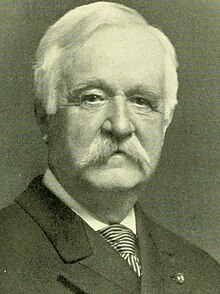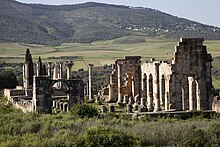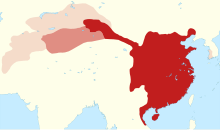The History Portal

Historia by Nikolaos Gyzis
History (derived from Ancient Greek ἱστορία (historía) 'inquiry; knowledge acquired by investigation') is the systematic study and documentation of the human past.
The period of events before the invention of writing systems is considered prehistory. "History" is an umbrella term comprising past events as well as the memory, discovery, collection, organization, presentation, and interpretation of these events. Historians seek knowledge of the past using historical sources such as written documents, oral accounts, art and material artifacts, and ecological markers. History is incomplete and still has debatable mysteries.
History is an academic discipline which uses a narrative to describe, examine, question, and analyze past events, and investigate their patterns of cause and effect. Historians debate which narrative best explains an event, as well as the significance of different causes and effects. Historians debate the nature of history as an end in itself, and its usefulness in giving perspective on the problems of the present.
Stories common to a particular culture, but not supported by external sources (such as the tales surrounding King Arthur), are usually classified as cultural heritage or legends. History differs from myth in that it is supported by verifiable evidence. However, ancient cultural influences have helped create variant interpretations of the nature of history, which have evolved over the centuries and continue to change today. The modern study of history is wide-ranging, and includes the study of specific regions and certain topical or thematic elements of historical investigation. History is taught as a part of primary and secondary education, and the academic study of history is a major discipline in universities.
Herodotus, a 5th-century BC Greek historian, is often considered the "father of history", as one of the first historians in the Western tradition, though he has been criticized as the "father of lies". Along with his contemporary Thucydides, he helped form the foundations for the modern study of past events and societies. Their works continue to be read today, and the gap between the culture-focused Herodotus and the military-focused Thucydides remains a point of contention or approach in modern historical writing. In East Asia, a state chronicle, the Spring and Autumn Annals, was reputed to date from as early as 722 BC, though only 2nd-century BC texts have survived. (Full article...)
Featured picture
Did you know (auto generated)

- ... that activist Gerlin Bean co-founded the Organisation of Women of African and Asian Descent in 1978, an event described as "a watershed in the history of Black women's rights activism"?
- ... that soccer player Danielle Marcano scored four goals in back-to-back games that helped to send the University of Tennessee to the NCAA tournament quarterfinals for the first time in history?
- ... that "End Zone" Jones ran for a career high in his final regular season game with Nebraska to finish third in the school's history in career rushing yards?
- ... that Clement Crisp, a dance critic for the Financial Times from 1956 to 2020, authored or co-authored 17 books on dance and dance history?
- ... that the entire inventory of historic string instruments in Canada's Musical Instrument Bank are loaned to musicians in a competition held every three years?
- ... that Kim E. Nielsen trained as a historian of women and politics, and came to disability history and studies via her discovery of Helen Keller's political life?
Alboin (530s – 28 June 572) was king of the Lombards from about 560 until 572. During his reign the Lombards ended their migrations by settling in Italy, the northern part of which Alboin conquered between 569 and 572. He had a lasting effect on Italy and the Pannonian Basin; in the former, his invasion marked the beginning of centuries of Lombard rule, and in the latter, his defeat of the Gepids and his departure from Pannonia ended the dominance there of the Germanic peoples.
The period of Alboin's reign as king in Pannonia following the death of his father, Audoin, was one of confrontation and conflict between the Lombards and their main neighbours, the Gepids. The Gepids initially gained the upper hand, but in 567, thanks to his alliance with the Avars, Alboin inflicted a decisive defeat on his enemies, whose lands the Avars subsequently occupied. The increasing power of his new neighbours caused Alboin some unease however, and he therefore decided to leave Pannonia for Italy, hoping to take advantage of the Byzantine Empire's vulnerability in defending its territory in the wake of the Gothic War. (Full article...)On this day
May 29: Feast day of Saint Paul VI (Catholicism)
- 1233 – Mongol–Jin War: The Mongols entered and began looting Kaifeng, the capital of the Jin dynasty of China, after a 13-month siege.
- 1416 – A squadron of the Venetian navy captured many Ottoman ships at the Battle of Gallipoli, confirming Venetian naval superiority in the Aegean Sea for the next few decades.
- 1913 – During the premiere of the ballet The Rite of Spring by Igor Stravinsky at the Théâtre des Champs-Élysées in Paris, the avant-garde nature of the music and choreography caused a near-riot in the audience.
- 1999 – Charlotte Perrelli, representing Sweden, won the Eurovision Song Contest, the first edition not to feature an orchestra or live accompaniment.
- 2011 – Residents of Portland, Oregon, held a rally called Hands Across Hawthorne in response to an attack against a gay couple holding hands while crossing the Hawthorne Bridge (pictured).
- Benedetto Pistrucci (b. 1783)
- G. K. Chesterton (b. 1874)
- Hubert Opperman (b. 1904)
- Uroš Drenović (d. 1944)
Selected quote
"Strike an enemy once and for all. Let him cease to exist as a tribe or he will live to fly in your throat again".
— Shaka, 19th century Zulu king
Related portals
More Did you know...
- ... that the Soviet Tupolev Tu-142 (pictured) maritime patrol aircraft was developed in response to the American UGM-27 Polaris submarine-launched ballistic missile?
- ... that Harry Powers said that watching his victims die was more fun than a brothel?
- ... that the effort put forth by the subject of Miró's 1937 Naked woman climbing a staircase and her heavy limbs are thought to reflect the tragedy of the Spanish Civil War?
- ... that 49% of German military losses happened in the last 10 months of the Second World War in Europe?
- ... that Thomas Edison lost a fortune in his ore-milling company, but "had a hell of a good time spending it"?
- ... that American McCaull Comic Opera Company actress May Yohé, once the owner of the Hope Diamond, died poor?
- ... that Egyptian political cartoonist Ahmad Nady took part in the 2011 Egyptian revolution, drawing cartoons while he demonstrated?
- ... that finds unearthed at the Israelite Tower in Jerusalem's Jewish Quarter attest to the Babylonian sack of the city in 586 BCE?
Topics
Categories

History • By period • By region • By topic • By ethnic group • Historiography • Archaeology • Books • Maps • Images • Magazines • Organizations • Fictional • Museums • Pseudohistory • Stubs • Timelines • Chronology • People • Wikipedia historians
WikiProjects
![]() WikiProject History •
Ancient Near East • Australian History • Classical Greece and Rome • Dacia • Former countries • History of Canada • Chinese history • European history • Heraldry and vexillology • Indian history • Jewish history • Medieval Scotland • Mesoamerica • Military history • Middle Ages • History of Science
WikiProject History •
Ancient Near East • Australian History • Classical Greece and Rome • Dacia • Former countries • History of Canada • Chinese history • European history • Heraldry and vexillology • Indian history • Jewish history • Medieval Scotland • Mesoamerica • Military history • Middle Ages • History of Science
WikiProject Time • Days of the Year • Years
WikiProject Biography • Composers • Political figures • Saints • United States Presidents
Things you can do
 |
Here are some tasks awaiting attention:
|
Associated Wikimedia
The following Wikimedia Foundation sister projects provide more on this subject:
-
Commons
Free media repository -
Wikibooks
Free textbooks and manuals -
Wikidata
Free knowledge base -
Wikinews
Free-content news -
Wikiquote
Collection of quotations -
Wikisource
Free-content library -
Wikiversity
Free learning tools -
Wiktionary
Dictionary and thesaurus






















![Image 9 Apollo 11 Photograph credit: Neil Armstrong Apollo 11 was the fifth crewed mission of NASA's Apollo program. After launching from the Kennedy Space Center in Florida on July 16, 1969, commander Neil Armstrong and Apollo Lunar Module pilot Buzz Aldrin landed Eagle in Mare Tranquillitatis on July 20, at 20:17:40 UTC, while command module pilot Michael Collins remained on Columbia in lunar orbit. Armstrong was the first to exit the spacecraft, stepping onto the surface 6 hours and 39 minutes later, on July 21, at 02:56:15 UTC; nineteen minutes later, Aldrin joined him on extravehicular activity, which lasted 2 hours, 31 minutes and 40 seconds. Armstrong and Aldrin lifted off from Tranquility Base after almost 22 hours on the lunar surface and rejoined Collins in the command module, before splashing down in the Pacific Ocean on July 24. The mission was planned to the minute, with the majority of the photographic tasks performed by Armstrong with a single Hasselblad camera. Most of the photographs taken on the Moon that include an astronaut are of Aldrin; there are only five images of Armstrong partly shown or reflected, as in this photograph, with Armstrong and the lunar module reflected in Aldrin's helmet visor. "As the sequence of lunar operations evolved," Aldrin explained, "Neil had the camera most of the time [...] It wasn't until we were back on Earth and in the Lunar Receiving Laboratory looking over the pictures that we realized there were few pictures of Neil." More featured pictures](http://upload.wikimedia.org/wikipedia/commons/thumb/9/98/Aldrin_Apollo_11_original.jpg/119px-Aldrin_Apollo_11_original.jpg)





























